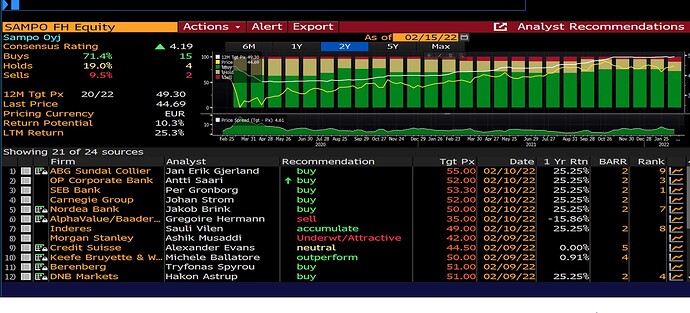I think many investors are too focused on the stock price at which Sampo is buying back its shares. Sure, Sampo was a much, much clearer value play in Spring 2020, when an investor basically got “the extras” of Sampo for free, and that would naturally have been the best time for Sampo to buy back the shares. That point is moot, though, as the funds for the buybacks were not there back then, and the share price recovered quite hastily too.
However, missing the boat then does not mean that all hope is lost now, I don’t think. Sampo is still quite fairly priced relative to the peer group and even the markets as a whole, and the core business is fine as ever. That doesn’t sound like a bad situation for buybacks to me. Besides, a lot of companies have successfully bought back its stock at significantly higher valuations, even though it generally doesn’t make sense to buy back stock then. For fine companies that are fairly priced, those buybacks generally work out.
My only concern here is whether Sampo can maintain a decent level of organic growth after completing the “reorganisations” regarding Nordea, Top, and the fintech investments. The growth rate will not be sky high by any means, but it should not be necessary either for creating value via buybacks. AutoZone is a great example of the wonders that buybacks can do for a boring business with a single-digit long-term growth rate. But if a business cannot grow its earnings, then buybacks will mostly amount to giving life support to its per-share numbers, as opposed to growing them both via earnings growth and diminishing share count. And as Sampo’s growth outlook is not the fastest beyond the possible Topdanmark acquisition, I reckon that long-term, it would be best not to buy back stock regularly but rather very opportunistically. That is because the one thing that none of us shareholders should want to see is what has happened to companies like Coca-Cola: tens of billions used for buybacks over the last decade, with next to no positive development in EPS. Sometimes it is better to pay tax for the dividend and redeploy the money as one sees fit.
E: a clarification with regards to the opportunistic vs. regular buyback strategy. I’m under the impression that most of the companies who regularly buy back significant amounts of shares fall under one or more of these groups:
- (high-) growth companies with capital-light business models, who simply use buybacks to “invest more” into their business than they could via traditional means,
- companies distributing profits more tax-efficiently by repurchasing shares with mixed results, or
- companies who have been blessed with CEOs obsessed with the buyback strategy, which usually means that they despise dividends AND they know a fair bit about capital allocation.
Sampo would certainly fall in group 2, which technically applies to all companies who do buybacks. Of those three groups, that is the one where valuation means the absolute most. You do not create value by overpaying for your own shares, even if it was more tax-efficient. I guess we cannot quite know whether Sampo can evaluate the value of their own shares yet, because there have been constant changes in Sampo’s holdings throughout the regime of Magnusson and co. Only time will tell, but I remain optimistic.
In contrast to just “any company” in group 2, a fine growth company from group 1 can easily boost its EPS by a lot by regularly buying back shares, thus greatly amplifying any growth. Think about it this way: if you use DCA and buy great, growing businesses, you will likely do extremely well over time - this is very similar. It should be noted, though, that any company should be mindful of the multiple paid for their own shares, but it is less crucial for growing businesses who can reap more and more rewards for every stock bought back as they keep growing their earnings.
Finally, Sampo does not belong to group 3 either, but let’s face it - only the best companies belong there anyway, and many fail en route. Using AutoZone as an example again, its CEO has bought back over 70 percentage of the outstanding shares during his tenure, turning a 4x change in net income into a 23x change in share price in 16 years.
This is not nearly related to Sampo, but it nonetheless shows how powerful a move repurchases can be, even when done constantly. However, I would strongly prefer to see Sampo just maintain the mandate to repurchase shares and act very quickly, if an opportunity was to arise. The dividend is the key piece in their story, and that should probably remain the case for a long time. Buybacks can be the enjoyable side dish. 
![]()

